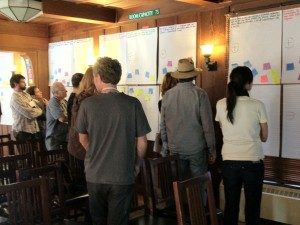
Did you know that California produces more vegetable seed than any other state? And that, according to a survey conducted as part of OSA’s State of Organic Seed report, the vast majority of California organic farmers surveyed agree that organic seed is important in maintaining the integrity of organic food production? Yet, only 38% of the vegetable seed used by California organic farmers surveyed was organic. Why are California farmers relying so much on conventionally produced seed? And how can we work to advance a seed system that benefits farmers and sustainable agriculture in the golden state?
In order to advance organic seed systems in California, OSA, with support from Columbia Foundation and in partnership with FarmsReach, convened an organic seed stakeholder meeting at the EcoFarm conference earlier this month to gather diverse perspectives on what’s working and not working in the seed industry and brainstorm ways to strengthen organic seed systems in California.
More than 20 participants — from farmers to certifiers to seed company representatives — identified opportunities for innovation, collaboration, and better communication across all phases of the seed supply chain. The interactive session gave these stakeholders a chance to make their voices heard. Some of the things we heard included:
From a farmer: “How do we work with the increasing number of private and public farmer training programs to incorporate seed saving/breeding curricula into their programs?”
From a seed producer: “We need more local trials.”
From a farmer: “Why do I go to the extra effort and money to buy organic seed while my neighbor gets away with using conventional seed?”
From a distributer: “We’re working on a new trial farm, but a database of seed trial [reports] would be incredible.”
By the end of the meeting, groups had formed to divise solutions in the following four areas:
— Information Networks for Seeds
— Seed Education & Training
— Seed Quality
— Seed Economics & Viability
I left the meeting inspired by the enthusiasm and insight of the participants. Moving forward, OSA will use both the input from this stakeholder’s session and the continued involvement of the members of these four focus groups to make targeted efforts to strengthen California’s organic seed system.
